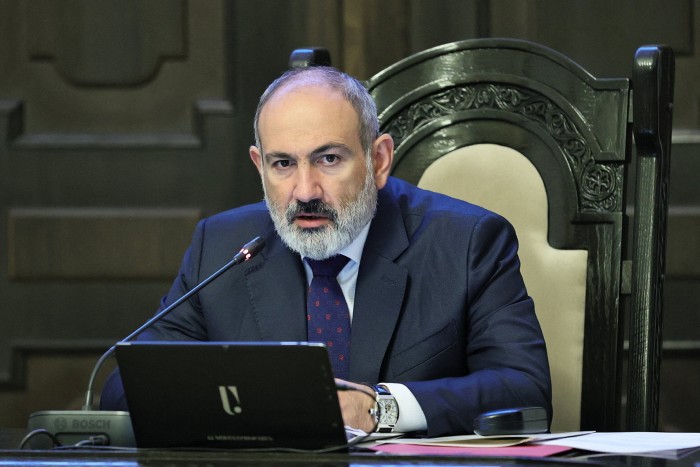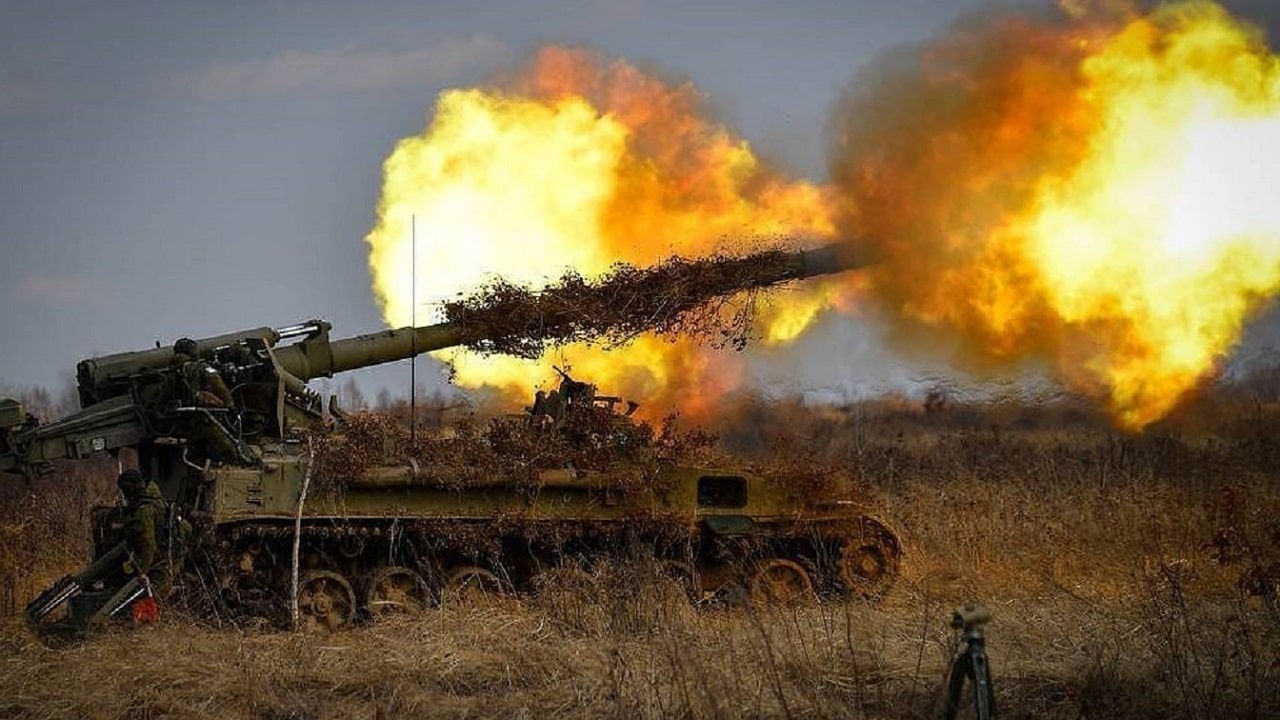Armenians ‘lose motherland’ in blow to Russia’s influence abroad
Armenians ‘lose motherland’ in blow to Russia’s influence abroad
Last week, Vardan Tadevosyan was still the health minister of a small if unrecognised republic in the south Caucasus mountains, managing dozens of government employees and running one of the busiest medical facilities in the region.
But in a span of 24 hours, the government of Nagorno-Karabakh ceased to exist. Soon, Tadevosyan’s staff began to leave their offices; patients vacated their hospital beds; doctors and nurses disappeared. There were so few police officers left that the streets started to feel unsafe.
Only the roads out of the region’s capital, Stepanakert, were busy — jammed with the tens of thousands of ethnic Armenians fleeing the city after Azerbaijan retook the breakaway enclave by force in a brief but bloody war last week. About 200 people were killed, according to local officials; the injured were soon ferried to Yerevan, the Armenian capital.
“We don’t have any more army, we have no police, no state . . . in two days, only ghosts will be around. The city will be totally empty,” Tadevosyan said, speaking by phone from the medical centre he founded 25 years ago.
He had come to the centre to pack up its equipment. “Almost all of my staff are already on their way,” he said. “Just a couple of people are still here, but all of them want to leave.”
 Medics at a burn centre in Yerevan, Armenia, attend to a patient after an explosion at a fuel depot in the Nagorno-Karabakh region © Hayk Baghdasaryan/Photolure/Reuters
Medics at a burn centre in Yerevan, Armenia, attend to a patient after an explosion at a fuel depot in the Nagorno-Karabakh region © Hayk Baghdasaryan/Photolure/ReutersStepanakert’s empty streets mark a tragedy for Armenia, a country that sees the mountainous region as its ancestral heartland — a point strongly disputed by its oil-rich neighbour Azerbaijan, which also has historical ties to the area.
It also marks an abrupt and brutal end to one of the most bitter land disputes born of the Soviet Union’s collapse, one that had defined the region for decades. The territory, which was internationally recognised as Azerbaijan’s, became known as a textbook “frozen” conflict, one that allowed Russia to continue playing power broker in what it terms its “near abroad”.
But as Armenia reels from the events of the past week, Russia’s hold over the country appears to have been damaged beyond repair. Moscow was long seen as Armenia’s key ally and security guarantor; Armenians expected it to protect the status quo and prevent the absorption of Karabakh into Azerbaijan.

“Our hopes rested on the Russians, they are our brothers. Why did they allow the Azerbaijanis to treat us this way?” said a former village shopkeeper, who had brought her thin, wizened, 85-year-old mother to a hospital after making the journey out of Karabakh. Both women had lost a son to one of the many wars for Karabakh.
In the hospital, located in Goris in southern Armenia, wards are filled with families who fled and are now recovering from their gruelling journey. So far, more than 70,000 people — or more than half of Karabakh’s total population — have left.
One woman spent two nights with her daughter, who has cerebral palsy, in the huge queue of cars that had formed along the single, serpentine road out from Karabakh, laying the 12-year-old on the ground when she had epileptic fits.
Another had brought her husband to the hospital; he had suffered a mini-stroke after crossing a checkpoint set up by Azerbaijan.
Armenia’s prime minister Nikol Pashinyan last week publicly criticised Russia and questioned the work of the 2,000 Russian soldiers that had been deployed since 2020 to keep the peace in Karabakh.
Pashinyan told Armenians that “the security systems and the allies we have relied on for many years” were “ineffective”, and that the “instruments of the Armenian-Russian strategic partnership” were “not enough to ensure Armenia’s external security”.
 Armenian prime minister Nikol Pashinyan has publicly criticised Russia © Armenian Government/AFP/Getty Images
Armenian prime minister Nikol Pashinyan has publicly criticised Russia © Armenian Government/AFP/Getty ImagesIt marks a historic shift in the country’s foreign policy and, for Moscow, a loss of one of its oldest allies. “We are convinced that the Armenian leadership is making a huge mistake,” the Kremlin said, decrying Pashinyan’s “pivot away from Russia” and “a frenzied anti-Russian campaign” in local media.
As protests broke out in Yerevan over the loss of Karabakh, some Armenians spoke of their fear that Russia could fuel the demonstrations in order to put pressure on Pashinyan, or even overthrow him, a claim the Kremlin swiftly denied.
Distracted by its draining war in Ukraine, Russia however is unlikely to muscle in, as it has been known to do when countries drift from its orbit, said Richard Giragosian, director of the Regional Studies Center, a think-tank in Yerevan.
“Yes, Moscow is angry with Yerevan. But Moscow is more angry and much more challenged by Baku,” Giragosian said. The seizure of Nagorno-Karabakh revealed “Russian weakness in the face of the Azerbaijani use of force”, furthering the “steady erosion of Russia’s standing and the slow death of the ‘myth of Russian military might’”, he said.
With Armenian public anger over the loss of Karabakh directed more at Russia, as well as the breakaway region’s elite, and at the west for its inaction, Pashinyan’s position seems secure, Giragosian said.
 A protest last week in Yerevan against Azerbaijan’s military actions in the Nagorno-Karabakh region © Narek Aleksanyan/EPA-EFE/Shutterstock
A protest last week in Yerevan against Azerbaijan’s military actions in the Nagorno-Karabakh region © Narek Aleksanyan/EPA-EFE/ShutterstockFears remain, however, that Azerbaijan’s ambitions could extend beyond Karabakh, which it first lost to Armenia in a war in the 1990s, and into southern Armenia.
Azerbaijan’s president Ilham Aliyev recently described the region as “western Azerbaijan”, though the two countries are also holding peace talks where they are expected to mutually recognise each other’s territorial integrity. “We have no claim on their territory,” Elin Suleymanov, Azerbaijan’s ambassador to the UK, told the Financial Times.
As the exodus from Karabakh continues, Azerbaijani security services have not yet entered Stepanakert, locals said. But border guards have made the first arrest of a member of the Karabakh elite. Another on Thursday decided to give himself up, travelling to Azerbaijan.
A process of disarmament is ongoing, with Karabakh soldiers handing over weapons to Azerbaijan at Russian peacekeeping bases.
That process is going peacefully, Suleymanov said. He rejected the notion of ethnic cleansing, saying people were leaving of their own accord, and though he acknowledged that they might be driven out by fear, he said they were victims of manufactured hysteria.
He described the region as being restored to “normalcy” after the fighting, with aid being delivered, field kitchens going up and Azerbaijani doctors soon to be sent to work in local hospitals.
Armenians fleeing Karabakh see things differently.
“It was chaos, an anthill. Everyone was rushing around in a panic,” said a 50-year-old teacher, holding her two-month-old granddaughter in the hospital in Goris. The family had struggled to find medical aid for an infection the baby had caught while they were sheltering underground from Azerbaijan’s offensive.
The child was saved by a doctor who had planned to evacuate but chose to stay on for longer when the baby’s condition worsened. On Monday, when nurses began handing out the hospital’s medical supplies for free, the family decided to risk it and leave.
Tadevosyan, who queried whether he should be referred to as the health minister of Nagorno-Karabakh since the republic no longer existed, said he was dismayed by the “very chaotic” evacuation.
“People just started to leave. No one is giving them instruction,” he said. He plans to leave as well, but not for some time yet. “I have to be one of the last to go.”
 Smoke rises from a fuel depot after an explosion near Stepanakert on Monday © Siranush Sargsyan’s Twitter account/AP
Smoke rises from a fuel depot after an explosion near Stepanakert on Monday © Siranush Sargsyan’s Twitter account/APLate on Monday, as people struggled to buy petrol for the journey out of Stepanakert, which is called Khankendi in Azeri, a massive explosion rocked a fuel depot, killing more than 100 people and covering the sky in thick, black smoke.
It was a devastating final blow, Tadevosyan said. “The explosion just killed everyone morally. We were already very sad. It is dramatic, tragedy feeling, when your country is leaving, and you lose your motherland.”
Armenia will process the historic loss for years to come. “I lost my identity,” Tadevosyan said.

Both Kyiv's and Moscow's forces have faced a shortage of ammunition in the now more than 19-month-long war, which at times has been little more than an artillery duel between the two sides.
The post Putin Has a New Problem: Russian Tanks Are Getting Defective Ammo in Ukraine appeared first on 19FortyFive.
At a House Oversight Committee hearing on Thursday, Rep. Jamie Raskin (D-MD) spoke about the impeachment inquiry into President Biden, blaming former President Trump for the hearing.
Fuel your success with Forbes. Gain unlimited access to premium journalism, including breaking news, groundbreaking in-depth reported stories, daily digests and more. Plus, members get a front-row seat at members-only events with leading thinkers and doers, access to premium video that can help you get ahead, an ad-light experience, early access to select products including NFT drops and more:
https://account.forbes.com/membership/?utm_source=youtube&utm_medium=display&utm_campaign=growth_non-sub_paid_subscribe_ytdescript
Stay Connected
Forbes on Facebook: http://fb.com/forbes
Forbes Video on Twitter: http://www.twitter.com/forbes
Forbes Video on Instagram: http://instagram.com/forbes
More From Forbes: http://forbes.com
At a House Oversight Committee hearing on Thursday, Rep. Jamie Raskin (D-MD) demanded a subpoena of Rudy Giuliani.
Fuel your success with Forbes. Gain unlimited access to premium journalism, including breaking news, groundbreaking in-depth reported stories, daily digests and more. Plus, members get a front-row seat at members-only events with leading thinkers and doers, access to premium video that can help you get ahead, an ad-light experience, early access to select products including NFT drops and more:
https://account.forbes.com/membership/?utm_source=youtube&utm_medium=display&utm_campaign=growth_non-sub_paid_subscribe_ytdescript
Stay Connected
Forbes on Facebook: http://fb.com/forbes
Forbes Video on Twitter: http://www.twitter.com/forbes
Forbes Video on Instagram: http://instagram.com/forbes
More From Forbes: http://forbes.com



Comments
Post a Comment